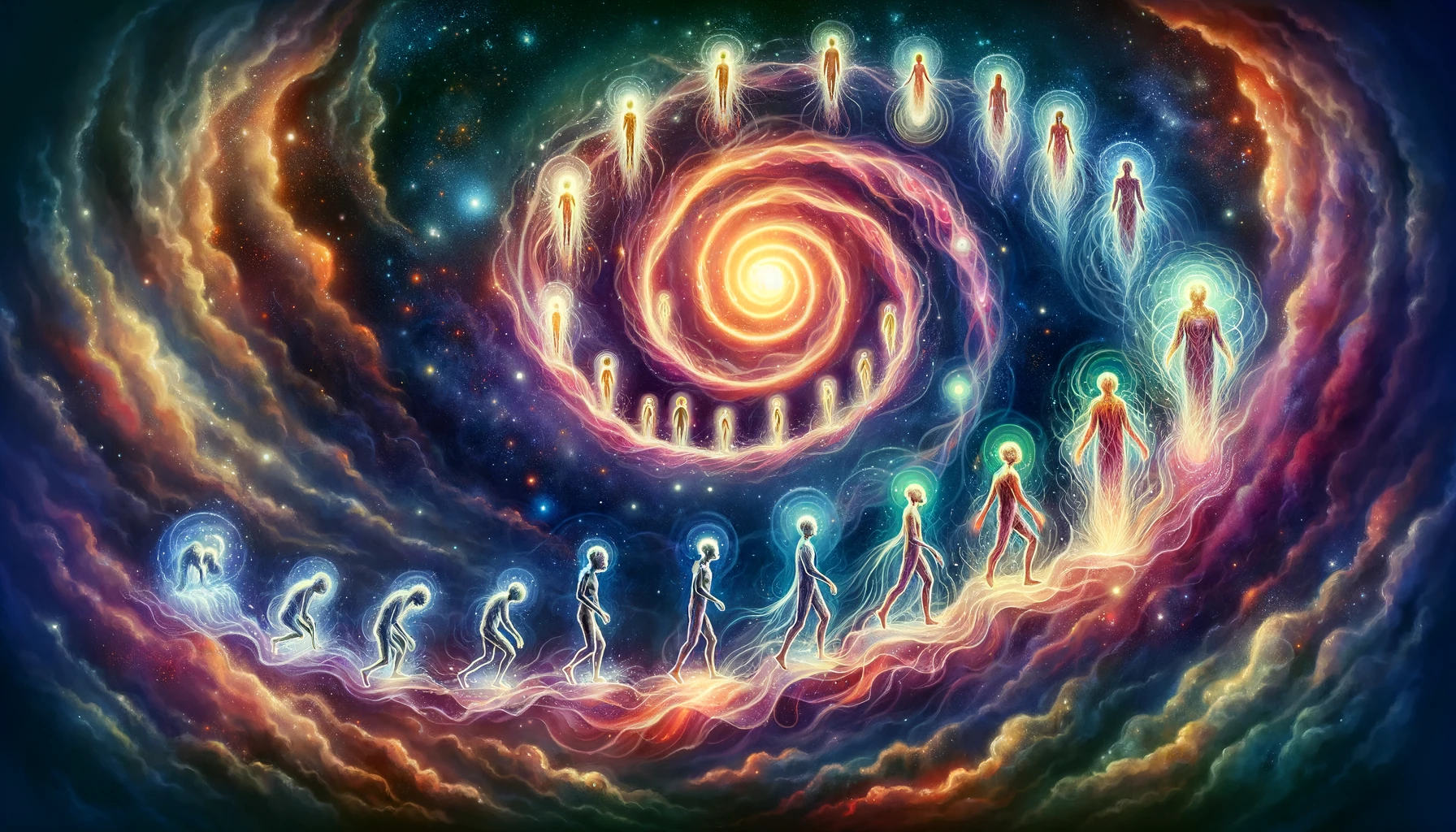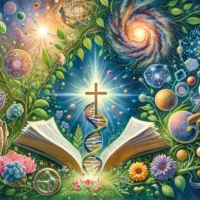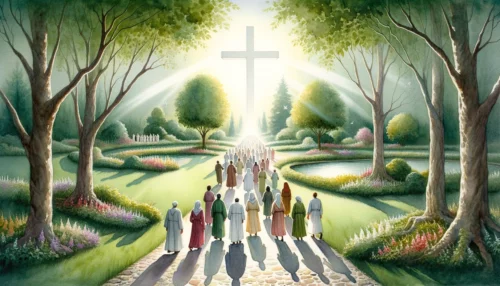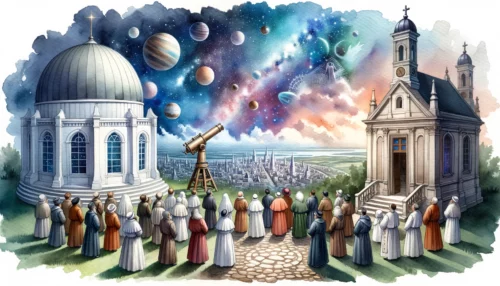Christian doctrine and the Bible provide a complex tapestry of teachings about life, death, and what comes after. Among the myriad of topics it covers, the concept of reincarnation — the belief that the soul, after death, begins a new life in a new body — is one that sparks curiosity and debate. This raises several questions: Is reincarnation mentioned in the Bible? Is it an idea supported by Scripture, or does it contradict the fundamental teachings of Christianity? How do interpretations of scripture align or conflict with this idea? And how do these perspectives affect our understanding of Christian faith and the afterlife?
Understanding Reincarnation and Its Origins
Reincarnation, a belief in the rebirth of a soul into a new body after death, is a concept found in various religious traditions around the world, notably in Hinduism, Buddhism, and Jainism. This idea suggests that a person’s soul undergoes a cycle of birth, death, and rebirth, evolving spiritually with each iteration until it achieves a state of perfection or enlightenment.
In Christianity, the belief system is centered on the teachings of the Bible, which presents a different perspective on life after death. According to Christian doctrine, human beings live once, and after this life, they face judgment (Hebrews 9:27). The Bible teaches that after death, individuals enter into eternal life or eternal damnation, based on their faith in Jesus Christ and adherence to His teachings.
The concept of being born again in Christianity refers not to physical rebirth in another body, but to a spiritual rebirth. Jesus Christ introduced this concept during a conversation with Nicodemus, explaining that to see the kingdom of God, one must be born again of the Spirit (John 3:3-5). This spiritual rebirth is a transformation that occurs within individuals when they accept Christ as their Savior, leading to a new life in Him.
The Bible emphasizes the resurrection of the dead as a core belief, highlighting the future resurrection of all people. Christians anticipate a bodily resurrection, akin to Christ’s own resurrection, where believers will be raised to eternal life, while non-believers will face judgment (1 Corinthians 15:42-44). This resurrection is distinct from reincarnation, as it involves a one-time, physical rising from the dead, rather than a cycle of rebirths.
Christian teachings also stress the importance of the present life as the opportunity for salvation and spiritual growth. The focus is on living a life in accordance with God’s will, embracing Jesus Christ’s teachings, and spreading the Gospel. The notion of reincarnation, with its implication of multiple lifetimes to rectify one’s soul, contrasts with the Christian view that this life is the decisive chance for individuals to respond to God’s grace.
The belief in reincarnation is not supported by Christian doctrine, which instead teaches the concepts of resurrection, judgment, and the finality of this life in determining one’s eternal destiny. The idea of being born again in Christianity relates to a spiritual transformation rather than physical rebirth in a new body. The Bible underscores the significance of the current life as the sole opportunity for salvation, contrasting with the reincarnation belief of multiple lives for spiritual evolution.
Biblical Passages and Their Interpretations
The Bible contains numerous passages that Christians interpret to understand life after death, judgment, and the hope of resurrection. These scriptures form the foundation of Christian beliefs about the eternal destiny of the soul, contrasting significantly with the concept of reincarnation.
One of the most pivotal New Testament passages is the account of Jesus’ death and resurrection. This event is not just a historical assertion but a theological cornerstone that affirms Jesus’ victory over death and the promise of eternal life for believers (John 20:1-18). The resurrection of Jesus is seen as the first fruits of those who have fallen asleep (1 Corinthians 15:20), signifying that believers too will experience a resurrection like His, not a cycle of rebirths into new lives.
Another key scripture is the parable of the rich man and Lazarus (Luke 16:19-31), which illustrates the finality of death and the immediate consequences for one’s eternal destiny. In this parable, Jesus describes a rich man suffering in Hades and Lazarus in comfort at Abraham’s side, emphasizing a fixed chasm between their states after death. This narrative underscores the belief in a permanent afterlife condition rather than a transient state that leads to reincarnation.
The concept of judgment is also central to Christian eschatology. The Bible speaks of a day when all will stand before the judgment seat of Christ to receive what is due for the things done in the body, whether good or evil (2 Corinthians 5:10). This judgment determines one’s eternal fate in the presence of God or separated from Him, reinforcing the notion of a singular life and judgment rather than successive lives and judgments.
The Bible discusses the transformation of believers at the end of time, describing how the dead in Christ will rise and the living will be caught up together with them to meet the Lord in the air (1 Thessalonians 4:16-17). This event, known as the rapture, highlights a collective resurrection and transformation, not an individual process of rebirth and spiritual progression through multiple lifetimes.
Christian doctrine, grounded in Biblical scripture, presents a clear narrative of life, death, and the afterlife that diverges from the concept of reincarnation. Key passages discuss the resurrection of Jesus as the model for believers’ own resurrection, the immediate consequences after death as shown in the parable of the rich man and Lazarus, the final judgment, and the collective transformation at the end of time. These teachings emphasize the significance of the present life as the sole opportunity for salvation and the preparation for an eternal destiny with or without God, rather than a cycle of reincarnations.
Commonly Misunderstood Passages Regarding Reincarnation
The Bible, rich in metaphor and allegory, contains passages that some interpret as suggesting reincarnation. However, a closer examination within the context of Christian theology clarifies these misunderstandings, reinforcing the Christian belief in resurrection and eternal life rather than the cycle of rebirth.
One passage often cited is Jesus’ conversation about Elijah in Matthew 17:10-13, where He indicates that John the Baptist came in the spirit and power of Elijah. Some interpret this to mean a literal reincarnation of Elijah as John. However, this interpretation misses the symbolic nature of Jesus’ words. He was not saying John was Elijah reborn, but rather that John came in the “spirit and power” of Elijah, fulfilling a similar prophetic role in preparing the way for the Messiah. This is about spiritual succession, not physical reincarnation.
Another passage is found in John 9:1-3, where Jesus’ disciples ask him about a man born blind, wondering if his blindness was due to his own sin or that of his parents. This question could imply a belief in pre-existence or reincarnation. Yet, Jesus’ response shifts the focus from the cause of the blindness to the purpose it serves in God’s plan, emphasizing that it was so “the works of God might be displayed in him.” This passage highlights the sovereignty of God and the purpose of suffering in revealing His glory, rather than endorsing a belief in reincarnation.
Ecclesiastes 1:4-9 is sometimes interpreted as suggesting a cyclical view of life, akin to reincarnation, with phrases like “generations come and generations go, but the earth remains forever.” However, this poetic reflection on the transient nature of human endeavors versus the permanence of the earth underlines the vanity of worldly pursuits, not the cycle of souls through various lives.
The Christian tradition, grounded in a thorough understanding of the Bible, does not support the concept of reincarnation. Misinterpretations of passages related to Elijah and John the Baptist, the man born blind, and the reflections in Ecclesiastes often stem from reading these texts without considering their broader theological context. These discussions emphasize spiritual legacies, the purpose behind human conditions, and the transient nature of life on earth, aligning with the core Christian beliefs in resurrection and eternal life, rather than reincarnation.
The Christian Perspective on Afterlife and Reincarnation
Within Christianity, the perspective on the afterlife is deeply intertwined with the core beliefs about sin, redemption, and the role of Jesus Christ as Savior. This view is distinct from reincarnation, which posits multiple lifetimes to achieve spiritual or moral perfection.
The doctrine of salvation in Christianity holds that sin has separated humanity from God, but through Jesus Christ’s sacrifice on the cross, individuals can be reconciled to God. This reconciliation is offered as a gift of grace, accepted through faith in Jesus Christ (Ephesians 2:8-9). The Christian afterlife, therefore, is not a cycle of births and deaths but a promised eternal life with God for those who believe in Jesus Christ.
The concept of eternal life in Christianity encompasses more than just an unending existence; it signifies a quality of life in perfect fellowship with God, free from sin and suffering (Revelation 21:4). This promise of eternal life begins not after death, but the moment an individual places their faith in Christ, indicating a relationship with God that death itself cannot sever (John 17:3).
In contrast, the idea of reincarnation suggests that an individual’s current life is one of many, with each life aimed at working off karma or achieving a higher spiritual state. This belief system implies that salvation or enlightenment is achieved through one’s efforts over many lifetimes. However, Christianity teaches that salvation is not the result of human effort or moral improvement but is a free gift from God through faith in Christ alone (Titus 3:5).
The Christian eschatological vision includes the resurrection of the body, a belief that at the end of time, all the dead will be raised. Believers will receive glorified bodies free from the ravages of sin and death (1 Corinthians 15:51-54). This resurrection is a cornerstone of Christian hope, affirming that death is not the end but the doorway to a new, eternal life in the presence of God.
The Christian perspective on the afterlife firmly rejects the concept of reincarnation, offering instead a vision of eternal life that is both a present reality through faith in Jesus Christ and a future promise of resurrection. This eternal life is characterized by a perfect, unbroken relationship with God, made possible by Christ’s sacrificial death and resurrection. Christianity holds that salvation is a gift of grace, not earned through multiple lifetimes of effort but received through faith in Jesus Christ, leading to a hope that transcends death itself.
Anchored in Faith
The Bible provides a clear and profound framework for understanding life, death, and the afterlife from a Christian perspective, distinctively different from the concept of reincarnation. Through the teachings of scripture, we grasp the significance of a singular, purposeful life grounded in faith in Jesus Christ. This life is not a series of trials in various forms but a singular journey towards eternal communion with God, underscored by the transformative power of Christ’s resurrection. Christianity offers not a cycle of rebirths but a promise of eternal life, a gift of grace to be received with faith.
Key takeaways:
- The Bible teaches a singular, purposeful life rather than a cycle of reincarnation.
- Salvation and eternal life in Christianity are gifts of grace through faith in Jesus Christ, not achievements of moral perfection over many lives.
- The Christian hope in the afterlife centers on the resurrection and an eternal, unbroken relationship with God.
Further Reflections:
- What does the promise of eternal life mean to you personally?
- How does the Christian view of the afterlife influence your daily life and decisions?
- In what ways can you share the hope of the resurrection with others?
Let this understanding of our faith be a lighthouse guiding you through life’s storms, a constant reminder of the hope and assurance we have in Jesus Christ. As you walk your path, let the truth of the gospel illuminate your way, bringing peace and purpose in the knowledge that our final destination is not a cycle of rebirths, but a homecoming into the eternal presence of God.














